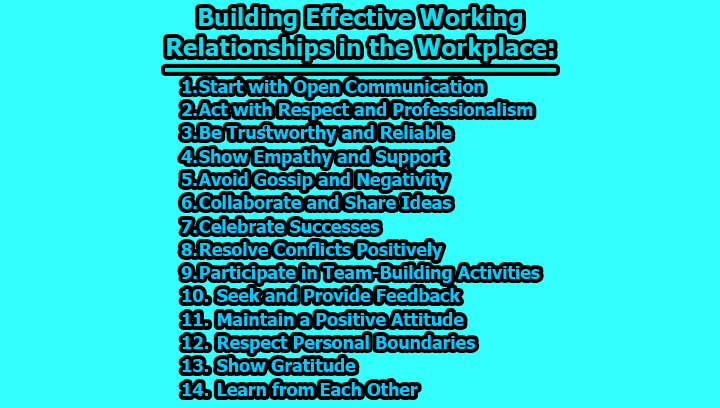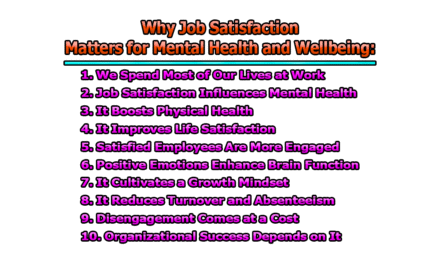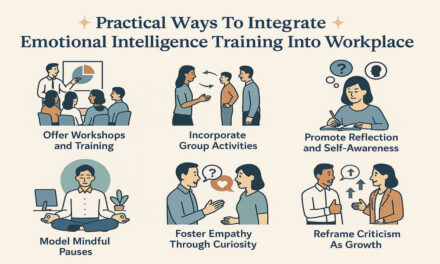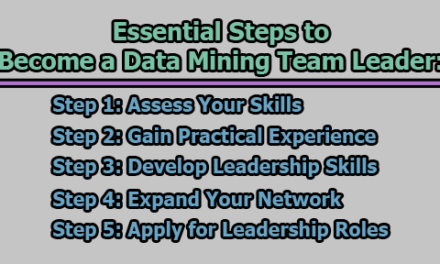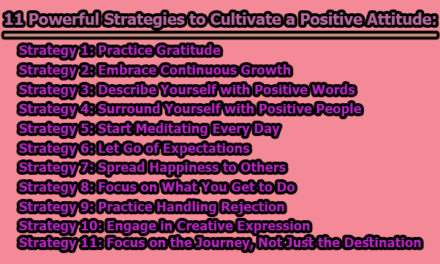In today’s fast-paced and interconnected world, the importance of building good and solid relationships in the workplace cannot be overstated. Working relationships are the connections formed with coworkers, colleagues, and managers in the professional setting. These relationships, though not as intimate as personal ones, play a crucial role in fostering effective teamwork, boosting morale, increasing productivity, and promoting personal growth. In this article, we will delve into the significance of working relationships and provide valuable tips on how to build and maintain them for a positive and thriving workplace atmosphere. Building effective working relationships in the workplace.
What is a Working Relationship?
A working relationship is a formal association with coworkers, colleagues, and managers that is essential for ensuring good teamwork and productivity in the workplace. While personal relationships involve sharing emotions and personal truths, working relationships focus on fostering collaboration, respect, and communication within a professional context. Regardless of the nature of one’s job, whether working in an office or as a remote freelancer, forming meaningful working relationships is fundamental to creating a fulfilling work environment.
The Importance of Working Relationships:
Working relationships are the backbone of any successful workplace. They are the connections formed between colleagues, coworkers, and managers that shape the dynamics of a team and impact overall productivity and job satisfaction. These relationships go beyond the formalities of the workplace and are essential for fostering effective communication, collaboration, and mutual support among team members. Here are some ways individuals can contribute to fostering positive relationships in the workplace:
a) Effective Teamwork: Strong working relationships lay the foundation for effective teamwork. When team members have good connections and mutual respect, they are more likely to communicate openly, collaborate efficiently, and solve problems collectively.
b) Improved Morale in the Workplace: Positive working relationships contribute to a harmonious work environment where conflicts are handled constructively, and colleagues treat each other with respect and goodwill. Such a culture fosters happier and more satisfied employees.
c) Increased Productivity and Job Satisfaction: When individuals get along well in the workspace and work cohesively as a team, productivity levels rise. This increased productivity, in turn, leads to higher job satisfaction and motivation among employees.
d) Enhanced Personal Growth: Building strong working relationships minimizes time spent on interpersonal conflicts, allowing employees to focus more on their professional development. Additionally, fostering relationships with senior staff provides opportunities for mentorship and learning from experienced colleagues.
Building Effective Working Relationships in the Workplace:
Building strong working relationships in the workplace is essential for fostering a positive and productive environment. These relationships are based on trust, mutual respect, effective communication, and support among colleagues, coworkers, and managers. Here are steps to help you build and maintain effective working relationships:
1. Start with Open Communication: Effective communication is the foundation of any successful relationship. Be open, approachable, and willing to listen to others. Encourage open dialogue and make an effort to understand different viewpoints and perspectives.
2. Act with Respect and Professionalism: Treat everyone in the workplace with respect and professionalism. Be courteous, considerate, and mindful of cultural differences. Avoid engaging in negative or disrespectful behavior, and focus on building a positive and inclusive atmosphere.
3. Be Trustworthy and Reliable: Trust is a critical element in any relationship. Be true to your word and follow through on commitments. Avoid making promises that you cannot keep, as it can erode trust. Demonstrating reliability builds confidence and strengthens working relationships.
4. Show Empathy and Support: Understand that everyone faces challenges and pressures in their professional and personal lives. Show empathy and offer support when colleagues are going through tough times. A supportive environment fosters stronger bonds and mutual respect.
5. Avoid Gossip and Negativity: Gossip can be damaging to working relationships and overall team morale. Avoid participating in gossip and negative conversations about colleagues. Instead, focus on constructive discussions and addressing issues directly with the concerned individuals.
6. Collaborate and Share Ideas: Actively participate in team projects and encourage collaboration. Be open to sharing ideas and insights, and be receptive to the ideas of others. Working together fosters a sense of unity and shared purpose.
7. Celebrate Successes: Acknowledge and celebrate the achievements of your colleagues. Offer praise and recognition for their hard work and contributions. Celebrating successes creates a positive and motivating atmosphere.
8. Resolve Conflicts Positively: Conflicts are a natural part of any workplace. When conflicts arise, address them constructively and respectfully. Focus on finding solutions rather than assigning blame. Seek mediation if necessary to reach a fair resolution.
9. Participate in Team-Building Activities: Engage in team-building activities and events organized by your workplace. These activities provide opportunities to bond with colleagues outside of work tasks and can lead to stronger working relationships.
10. Seek and Provide Feedback: Be open to feedback from colleagues and supervisors. Constructive feedback helps you improve and shows that you value others’ opinions. Similarly, provide feedback in a supportive and constructive manner to help your colleagues grow professionally.
11. Maintain a Positive Attitude: A positive attitude is contagious and can uplift the entire team. Even during challenging times, focus on finding solutions and maintaining an optimistic outlook. Your positivity can inspire others to do the same.
12. Respect Personal Boundaries: While building working relationships, it’s important to respect personal boundaries. Not everyone may be comfortable sharing personal information, and that is okay. Be sensitive to individual preferences and be mindful of maintaining professionalism.
13. Show Gratitude: Express gratitude for the assistance and support you receive from colleagues. A simple “thank you” can go a long way in fostering appreciation and goodwill.
14. Learn from Each Other: Embrace the opportunity to learn from your colleagues. Each individual brings unique skills and experiences to the table. Be open to learning from others and sharing your expertise as well.
It is apparent that building effective working relationships is a critical aspect of succeeding in any job. These connections with coworkers, colleagues, and managers not only enhance teamwork and productivity but also contribute to a positive and supportive work environment. By communicating effectively, being consistent and trustworthy, avoiding gossip, supporting fellow team members, remaining positive, knowing company guidelines, and delivering quality work, you can foster strong working relationships that lead to personal growth and success in the workplace. Embrace these principles, and you will contribute to a harmonious and thriving professional environment that benefits everyone involved.
Frequently Asked Questions [FAQs]:
Why are working relationships important in the workplace?
Working relationships are crucial in the workplace because they contribute to effective teamwork, improved morale, increased productivity, and personal growth. Positive relationships foster a supportive and collaborative environment, where employees feel valued and motivated to perform at their best.
How do working relationships differ from personal relationships?
Working relationships are formal associations with colleagues, coworkers, and managers, aimed at achieving common work-related goals. They focus on teamwork, communication, and productivity. In contrast, personal relationships involve emotional connections and sharing personal experiences with family and friends.
What are some benefits of effective teamwork in the workplace?
Effective teamwork leads to better problem-solving, increased creativity, and efficient completion of tasks. It also enhances communication, reduces conflicts, and fosters a positive work environment.
How can I improve my communication in working relationships?
To improve communication, actively listen to others, be clear and concise in your messages, and be open to feedback. Avoid interrupting or jumping to conclusions, and ask clarifying questions to ensure understanding.
How can I handle conflicts in working relationships?
Handling conflicts involves addressing issues directly, using “I” statements to express your feelings, and actively listening to the other person’s perspective. Avoiding blame and seeking common ground are essential in finding resolutions.
How can I build trust with my colleagues?
Building trust involves being reliable, keeping promises, and being consistent in your actions. Be supportive and demonstrate genuine concern for the well-being of your colleagues.
How can team-building activities benefit working relationships?
Team-building activities provide opportunities for team members to bond, improve communication, and build trust. They also promote a sense of camaraderie and unity among team members.
What should I do if I face gossip or negativity in the workplace?
If you encounter gossip or negativity, avoid participating in such conversations and redirect discussions towards positive and constructive topics. Address any concerns directly with the individuals involved or seek help from a supervisor if needed.
How can I show appreciation for my colleagues’ efforts?
Express gratitude and acknowledge your colleagues’ hard work and contributions. A simple thank-you note, a word of praise, or a small gesture of appreciation can make a significant impact.
What are some tips for networking and building relationships with senior staff?
Attend networking events, engage in professional conversations, and seek mentorship opportunities with senior staff. Show interest in their experiences and expertise, and be proactive in seeking guidance.
How can I maintain work-life balance while building strong working relationships?
Prioritize your time and set boundaries to ensure a healthy work-life balance. Make time for meaningful connections with colleagues during work hours and set aside personal time for relaxation and rejuvenation.
What can I do if I find it challenging to connect with certain colleagues?
Be patient and persistent in your efforts to build connections. Find common interests or projects to work on together. Seek opportunities to collaborate and find ways to support each other professionally.
How can I contribute to a positive and inclusive work environment?
Promote inclusivity by valuing diversity, respecting different perspectives, and encouraging open dialogue. Be an active participant in creating a supportive and respectful workplace culture.
How do I navigate working relationships in a remote or virtual work environment?
In remote work settings, use digital communication tools effectively, schedule virtual meetings for face-to-face interactions, and maintain regular check-ins with team members. Make an effort to create a virtual watercooler atmosphere for informal discussions.
Can I maintain friendly relationships with colleagues while still being professional?
Yes, it’s possible to have friendly relationships with colleagues while maintaining professionalism. Balance friendliness with appropriate boundaries, and prioritize professionalism in all work-related interactions.

Library Lecturer at Nurul Amin Degree College

